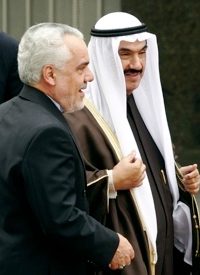
The charges against Rahimi appear to reflect an indirect challenge to the combative Iranian President and his Revolutionary Guard which cracked down on Iranian students who demonstrated against the (probably stolen) re-election of Ahmadinejad. The nation of Iran — like so much of the world — though it ought to be affluent and happy, is instead poor and miserable.
The Iranian plans to build nuclear power plants are a sick comedy. The nation is a major oil producer — what on earth does it need with nuclear power? Why risk the wrath of international sanctions to create an energy source for a nation which sits atop some of the largest petroleum reserves in the world? President Ahmadinejad is another of the old, familiar, dreary bosses of an unhappy nation. His outrageous comments and conduct are meaningless, really, except to show that he lusts for power as much as any other boss.
Modern history is filled with instances of men — coming to power in nations rich in natural resources — who managed to create misery and poverty in their land (and blame it on someone else). Castro, for instance, took over a Cuba which was in many ways more affluent than most nations of Western Europe. So profound was his Marxist mismanagement, however, that after a decade or so of his rule, Cuba actually began rationing sugar (which would be similar to Idaho rationing potatoes). Why? Well, Castro sent troops to Angola and Mozambique, across the Atlantic Ocean, to install Marxist regimes. He meddled in Latin American affairs (and is still doing so).
Juan Perón took over an Argentina with a strong European influence and a Pampas which was one of the breadbaskets of the world. Like Cuba, Argentina had been an affluent nation, wtih no natural enemies in the world. So Perón, like Castro and Ahmadinejad, had to invent enemies. His campaign against imaginary foes of the country has caused great harm to ordinary Argentineans. The familiar bogeymen were so predictable: devout Christians, “capitalists” (whatever that means), ordinary middle-class folk, people who want a quiet public life for their nation, etc.
Mexico is another example of a nation broken by radical politics. Blessed with many natural resources, it is a diverse and beautiful country, with rich farmland and good harbors. And the Mexican people are hard working and religious. So why is Mexico poor? Why the flood of Mexicans into the United States? Because after a long, sad period of political corruption has destroyed what Mexico once was, its citizens find that crossing the border into the United States brings them into a transformed world of relative order, integrity, and peace.
Persia possesses one of the oldest and richest traditions of any nation on the planet. Its culture has been a profound influence in central Asia. Even without oil, Persia has been a rich, powerful, and generally peaceful and tolerant land for thousands of years. Under the Shah, religious minorities — Christians, Jews, Bahai, and Zoroastrians — lived unmolested. Women walked in public without heavy coverings. The nation of Iran, as it was more commonly called, was prosperous.
Now Iran is poor and oppressed. The infighting of the groups who rule the country seems to have little to do with real issues; power, instead, is the motive. When in December Ahmadinejad dismissed his longtime foreign minister, Manouchehr Mottaki, it caused a rift within factions in Iran. Ali Larijani, Chairman of the Iranian Parliament, was close to Mottaki. Larijani’s brother, Ayatollah Sadeq Larijani, who is chief of the Iranian judicial system, brought the charges shortly after the Foreign Minister was fired. Larijani himself has a whole family inside the Iranian political system.
The mix of Islamic politics, as we have grown accustomed to now, means that some mullahs will support one faction and some another. Each side will claim to be acting in accordance to the Koran and to the will of Allah. The Iranian people, of course, will suffer. Expatriates of the dreadful rule of radical Islam in power pine away in America hoping that the people of that tortured land, who are the principal victims of all the machinations intended to titillate the world press, will rise up and cast off their shackles. We should hope and pray that they do.
Photo: Kuwaiti Prime Minister Sheikh Nasser Al Mohammed Al Sabah, right, is welcomed by Iranian Vice-President Mohammad Reza Rahimi, left, during an official welcoming ceremony at the presidency in Tehran, Iran, Nov. 21, 2009.: AP Images



